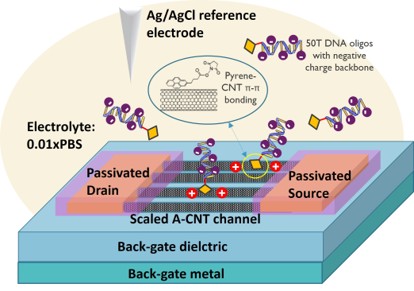Exploring single-molecule sensing with nanoscale aligned carbon nanotube liquid-gated FETs
PhD - Leuven | More than two weeks ago
High-throughput single-molecule read technologies are critical for advancing omics, including genomics and proteomics, with numerous applications in health and life sciences. FET-based biosensors promise advances in readout throughput by higher integration density. Previously, we have shown progress by detecting several tens of molecules with Si bio-finFETs and Si nanowell FETs with ultra-scaled gate length of <50 nm. However, single-molecule sensing remains to be proven for manufacturable top-down Si FET technologies. While single molecule detection has been reported using single CNT bioFETs, their fabrication process remains unsuitable for wafer-scale manufacturing. We introduced aligned carbon nanotube FET based biosensor as the solution. ACNT FETs hold strong potential for single-molecule sensing, as its atomically small and pristine body does not spontaneously form a gate dielectric layer. This leaves the surface chemically inert and uncharged in electrolyte, minimizing ionic screening of target biomolecules, increasing sensitivity, and reducing noise.
At imec, functional, electrolytically gated ACNT FETs have been demonstrated with low subthreshold swing, and initial multi-molecule biosensing results have been achieved. A robust lab process for fabricating these devices is now in place. The key advantage of our ACNT FETs is that they are based on manufacturable wafer-scale, high-throughput solution-phase assembled ACNTs. Prior single-molecule detection was based on single-tube devices, which are not suited for manufacturing.
Building on this foundation, this PhD will advance single-molecule sensing using manufacturable CNT FETs. The work combines experimental studies with advanced simulations (e.g., TCAD and quantum transport models) to unravel the underlying physical mechanisms in liquid-gated CNT devices.
The research will start with a literature review, followed by fabrication and electrical characterization of CNT FET nanodevices in the imec environment to establish fundamental device physics. Experimental insights will then be bridged with quantum-level simulations to clarify the role and potential of CNT bioFETs. Finally, to enable true single-molecule detection, the project will investigate CNT–molecule interactions and design optimized molecular tags for integration with CNT-based biosensors.

Required background: Electrical Engineering, Nanotechnology, Device physics, Biological Engineering
Type of work: 25% experimental lab process, 45% experimental characterization, 25% modeling/simulation, 5% literature
Supervisor: Pol Van Dorpe
Co-supervisor: Koen Martens
Daily advisor: Lijun Liu
The reference code for this position is 2026-122. Mention this reference code on your application form.
